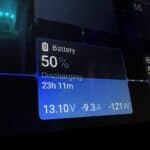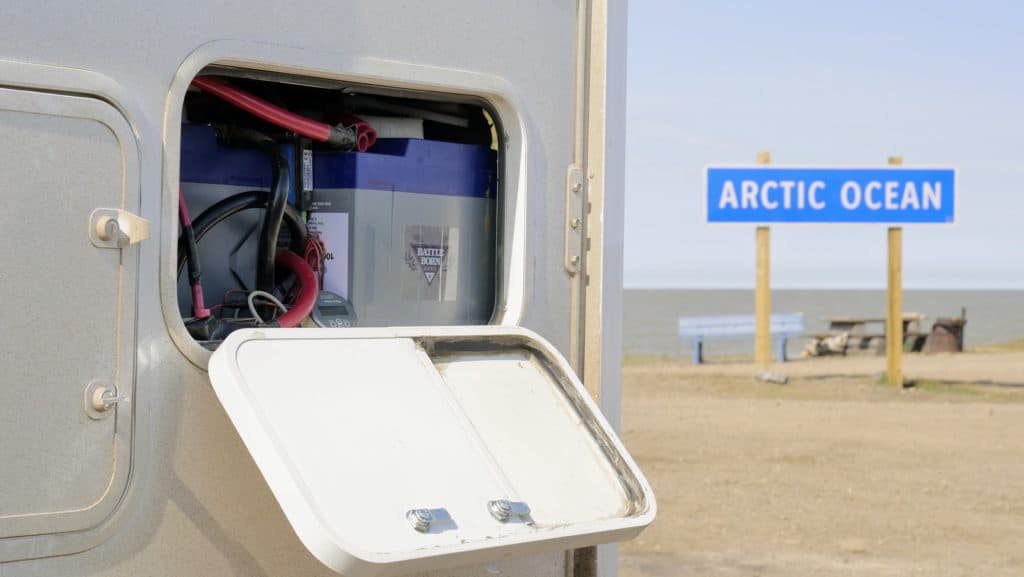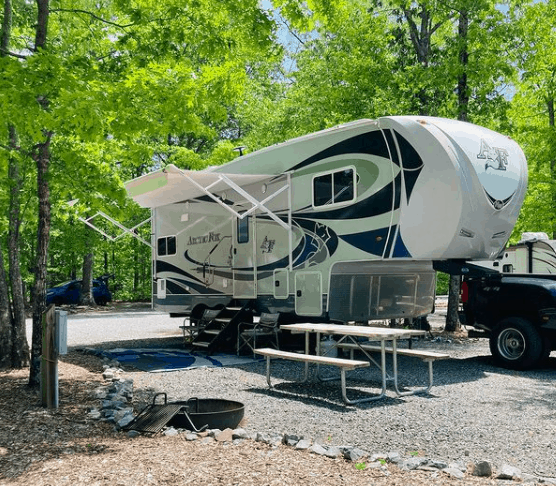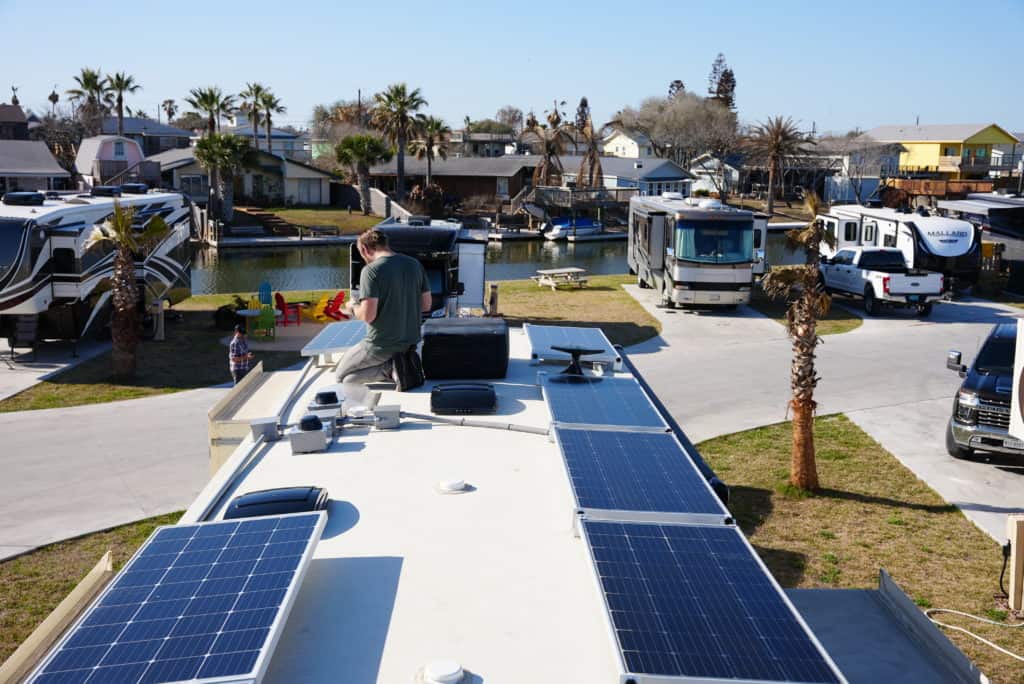
MENUMENU
TALK TO AN EXPERT
Special Hours: 7AM – 6PM PST
TALK TO AN EXPERT
Special Hours: 7AM – 6PM PST
RV batteries can be charged in numerous ways. The right battery charger ensures your batteries receive the correct voltage and charging profile for their chemistry, helping you avoid early failure and poor performance. If you’re unfamiliar with RV battery charger systems and want to learn how they work to get the best charge for your battery, you’re in luck.
In this guide, we’ll break down the main types of RV battery chargers, how to size them correctly, and what to look for when upgrading or switching from lead-acid to lithium batteries.
Charging your RV batteries is essential if you plan to use your RV off the grid, but necessary even if using it at full hookup RV parks. Luckily, there are multiple ways to do it.

Having the right RV battery charger is vital; the type of charger will primarily depend on your RVing style and rig setup. There are several types of RV battery chargers, and the most common are converter chargers, inverter chargers, solar RV battery charge controllers, and multi-battery chargers. We’ll discuss each of these at length further on.
Along with having the right charger type, you also need a power source. Power pedestals or electrical hookups are among the most common power sources, but RVers can also use solar panel systems, generators, wind power, and even their tow vehicle or RV’s engine.
Before choosing a charger, it’s important to understand the difference between lead-acid and lithium (LiFePO₄) charging. Each chemistry accepts and holds charge differently, and your charger must be matched accordingly.
| Feature | Lead-Acid | Lithium (LiFePO₄) |
|---|---|---|
| Charge Stages | Bulk → Absorption → Float (+ occasional Equalize) | Constant Current → Constant Voltage (Bulk/Absorb + Float) |
| Typical Voltage | 14.4V Bulk / 13.6V Float | 14.2–14.6V Bulk / ≤13.6V Float |
| Equalization | Required periodically (Flooded only) | Not used |
| Temp Compensation | Required | Not used |
| Charge Speed | Slow; current tapers early | 2–4× faster; accepts high current |
| Maintenance | Needs periodic charging & watering | Maintenance-free |
| Storage | Needs float charge | Disconnect or float ≤13.6V |
Lead-Acid Batteries:
Use multi-stage charging with temperature compensation. They charge slowly and should be brought to full voltage regularly to prevent sulfation.
Lithium (LiFePO₄) Batteries:
Use a simplified two-stage charge—constant current followed by constant voltage. They charge quickly because they don’t require slow absorption rates, and shouldn’t be equalized or trickle-charged continuously.
🔋 Pro Tip: When upgrading to lithium, confirm your charger supports programmable voltage settings or has a dedicated lithium charging profile.
See: Charging Lithium Batteries: The Basics
There are a handful of charger types we think are worth discussing when it comes to charging your RV battery. Here’s a breakdown of the most common options and how they apply to both lead-acid and lithium batteries.
In the RV industry, you will most commonly hear the built-in battery charger called a “converter“.These are the most common chargers found in RVs from the factory. A converter takes 120V AC power from shore or generator power and converts it to 12V DC to charge your batteries and run onboard electronics.
All RVs come with a converter charger, as it’s required for the DC system to work even when plugged in. It operates without you having to think about it and will likely be buried in the underbelly of an RV or mounted in a hidden location since you won’t need to access it regularly.
These converters can be very basic “power supplies” or have multi-stage battery charging profiles.

RVers who use their RVs off-grid love inverter chargers. These are dual-function devices that can invert DC to AC (for off-grid power) and charge your batteries when connected to shore or generator power. This means that you can power appliances that run through your inverter charger from your RV battery bank.
While an inverter charger may allow you to use the microwave, watch TV, or use basic functions of the power inlets in your RV, they’re not perfect. Inverter chargers have a maximum amount of power that they can invert, which means being mindful of your electrical usage, depending on what you’re powering. When buying your equipment, do an energy audit to ensure your inverter charger can handle the load.

A solar RV battery charge controller regulates power coming from solar panel(s) on your RV roof to your battery bank. Solar panels usually do not produce the correct voltage to charge the batteries, which means it need to be modified. These controllers modify the power to properly charge the battery and power the DC systems.
A solar charge controller has a limit to the amount of power sent to your battery bank, so make sure you have the proper size charge controller to match your solar capacity.

Generally speaking, DC to DC battery chargers can be used when connecting one battery system to another.
In the RV context, a DC-to-DC charger allows your vehicle’s alternator to charge the RV’s house batteries safely while driving. This protects both your alternator and your battery bank. These chargers also turn off when the engine turns off so as not to drain the starting battery.
DC-DC chargers are also used between different battery types, like lead-acid of a starting battery to lithium house batteries.
Examples include: Victron Orion XS or Sterling Power BB series.
Multi-battery chargers are used in complex systems like marine or industrial setups where multiple battery banks charge independently. Rare in RVs, but worth noting if you run separate systems for your chassis, house, or accessories.
Most of the time, when multiple batteries are used, they are installed in series or parallel as one large bank. In these cases, the chargers mentioned above can charge all the batteries at once.
Follow these steps to choose the right charger for your system:
A charger that’s too small will take longer to fill your batteries; too large can shorten battery life.
Use this rule of thumb:
| Battery Bank (Ah) | Minimum Charger (A) | Ideal Charger (A) | Max (A) |
|---|---|---|---|
| 100Ah | 20A | 40–50A | 50A |
| 200Ah | 40A | 60–100A | 100A |
| 400Ah | 80A | 100–200A | 200A |
For lithium batteries, keep your charge rate ≤0.5C (e.g., ≤50A for a 100Ah battery).
| Power Source | Best Charger Type | Notes |
|---|---|---|
| Shore Power | Converter or Inverter/Charger | Easy plug-and-play charging |
| Generator | Converter or Inverter/Charger | Choose one with high efficiency and adjustable charge rate |
| Alternator (while driving) | DC-to-DC Charger | Protects alternator and ensures correct voltage |
| Solar | MPPT Solar Charge Controller | Always choose programmable lithium-compatible MPPT |
Look for:
A good charger can still cause problems if installed incorrectly.
Always:
RVers can use several types of power sources for charging their RVs. If you enjoy using your RV off-grid, there’s a good chance you use more than one of the following power sources.
Shore power charging is what many RVers commonly use when parked at a campground or home. This could be 15, 20, 30, or 50 amp power that uses a converter charger or inverter charger to feed your batteries.
We recommend you use a surge protector when on shore power, preferably with a shutdown feature to disconnect in case of a power system issue.

Generator battery charging uses the same charger as the shore power supply (a converter or inverter charger), but the power comes from a generator.
Some RVs come with onboard generators, while some RVers choose to carry a portable generator with them while RVing. Generators come in various sizes and with different power-creating abilities. The more watts a generator can produce, the more powerful it is.
When you’re charging your RV battery using alternator charging, you can charge your RV’s battery bank while driving. It’s best to use a DC to DC charger, which helps protect and extend the life of your RV battery and not overload your vehicle alternator. Most DC to DC charger models have the same three-stage charging modes that all chargers have, and it will safely charge the battery and prevent alternator damage and starter battery drain,
Something to keep in mind: Using your alternator to charge your house battery often will wear out your alternator faster. You can preserve your alternator by using fewer amps and by charging your battery with shore or solar power as often as possible.
Solar power charging is a favorite charging style for those who love boondocking. Your batteries will be charging anytime they’re not fully charged, and the sun is shining. Many RVers will roof-mount solar panels or use a portable panel to move around.
This is an excellent option for those boondocking because there’s little to no maintenance required. You also won’t need gas on hand for your generator or worry about your battery power suddenly going.

Portable chargers and maintainers are good to have as a backup to the built-in charging system or can be used to balance and charge individual batteries. In large series systems 24V or 48V, it’s recommended to occasionally top each battery off individually to make sure the system is balanced. These can also be used to maintain charge when in storage, particulary critical with lead acid batteries.
| Power Source | Best Charger Type | Typical Use | Notes |
|---|---|---|---|
| Shore Power | Converter or Inverter/Charger | Campground / Home | Fastest full charge; lithium-compatible models available |
| Generator | Converter or Inverter/Charger | Off-grid / Backup | Same setup as shore power; verify generator wattage |
| Vehicle Alternator | DC-to-DC Charger | While driving | Protects alternator; limits current for lithium |
| Solar Panels | MPPT Solar Charge Controller | Off-grid / Supplemental | Continuous charging when sunlight is available |
| Portable AC Power | Smart Portable Charger | Storage / Top-offs | Great for seasonal RVs or maintaining battery health |
The best type of RV battery charger will depend on your travel style and battery type. A multi-stage, programmable charger is typically the best as it provides the most flexibility and best charging for all battery types.
To compare top models and learn which chargers perform best with lithium systems, read The Best Deep Cycle Lithium Battery Chargers & Charging Methods.
➡ When you’re ready to upgrade, explore our full selection of lithium-compatible RV battery chargers in the Battle Born Batteries shop.
Q: Can I use a lead-acid charger for lithium batteries?
Only if it’s programmable or supports lithium-specific settings (14.2–14.6V bulk, ≤13.6V float, no equalize/temp comp).
Q: How long does it take to charge an RV battery?
A 100Ah lithium battery charged with a 50A charger reaches full in about 2 hours. Lead-acid may take 4–6 hours due to slower absorption.
Q: Can I charge my RV batteries while driving?
Yes, with a DC-to-DC charger. It protects your alternator and ensures safe voltage for the house bank.
Q: Do I need to keep lithium batteries plugged in?
No. Lithium can rest disconnected once full. If left connected, set float ≤13.6V.
We know that building or upgrading an electrical system can be overwhelming, so we’re here to help. Our Reno, Nevada-based sales and customer service team is standing by at (855) 292-2831 to take your questions!
Also, join us on Facebook, Instagram, and YouTube to learn more about how lithium battery systems can power your lifestyle, see how others have built their systems, and gain the confidence to get out there and stay out there.
Shop Best Sellers








Ask a technical specialist now at 855.292.2831
Stay in the Know